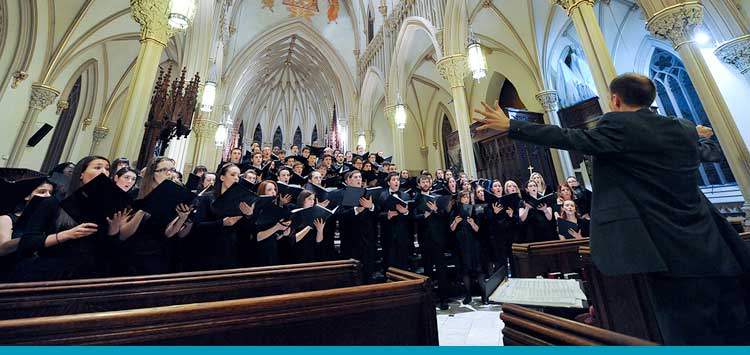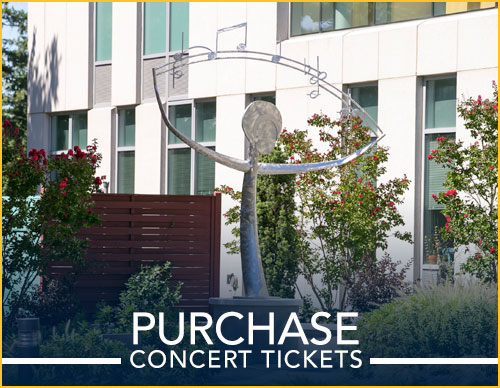Finding Scores
The Music Library is currently in the midst of a major multi-year project in which the holdings records are being fully cataloged and entered into the university’s online catalog, Lexicat. Until this project is completed you will need to check both Lexicat and the Music Library Card Catalog to locate items in the collection.
Music Library Card Catalog:
useful for finding scores, and some books, which have not yet been entered into Lexicat.
- Title Cards: (white) cards list the title of the book or score. Works published in collections are listed by the publisher’s title, and not the individual works as listed in the Table of Contents.
- Author/Composer: (blue) cards for each composer list a work by that composer.
- Category: (salmon) cards are grouped by etude/ensemble, piano, voice, etc. as listed on the drawer labels.
CD Catalog:
this is in a 3-ring binder at the Music Library Circulation Desk. Works are listed alphabetically by composer using uniform titles.
Searching Techniques:
Using Lexicat
Easy to find: operas, works with distinctive titles, or works of lesser known composers
Best searches: by title (e.g. Tosca), by composer (e.g. Partch, Harry -- but not Bach, Johann Sebastian!), or guided search to combine author/title (author: Crumb; title: black angels)
Harder-to-find: works with generic titles (e.g. symphonies, concertos, sonatas)
Best searches: words from titles/subjects (E.g. to find Mozarts "Haffner" Symphony, K.V. 385 do a keyword search: symphon* 385 [Note: the asterisk is a wild card here to catch symphony, symphonie, symphonies, etc.]
Finding works for specific combinations of instruments (know your subject headings)
Technique 1: Find a work you know has the right combination - look at its subject heading(s) e.g. If you're looking for works for bassoon clarinet and oboe and you know that Jacques Ibert's Cinq pieces en trio is for that combination, search the title: “Cinq pieces en trio” - [Note: the subject heading is: Woodwind trios (Bassoon, clarinet, oboe)]. Search under it for similar works - or simply click on it to "re-direct" the search.
Technique 2: Use keyword search: bassoon clarinet oboe - [Note: results are fuzzier, but more comprehensive.]
Limiting your result set: Once you've done your search, look for the "Limit/Sort search" button at the top of the screen. By clicking it, you can filter your results by one or more of the following (Note: you can only do this once, so be sure to get all your limits in place the first time):
- Location: Here you can choose a specific collection in Lexicat, ie: Axinn Circulating Collection or Monroe Hall - Music Library
- Format of material: Here you can choose to limit your results to printed music or sound records
- Lanugage: Here you can choose to limit your results to a particular language
- Words in Author: If you initially searched by title or keywords, you can narrow your search with the composer's name (or in the case of a recording, the performer). The pull-down menu allows you to change this limit to words in Author/Title/Subject/Publisher
Using call numbers (best for browsing the stacks, NOT for finding something specific)
Find call numbers by using the Library of Congress M Class Schedule and look up the subject in the index. (Note: Look for call numbers beginning with M for scores and recordings. e.g. Looking under Horn, one finds Instrumental music M80-, with orchestra M1028-, with string orchestra, M1128- and with piano M255-)
Or, use the Library of Congress Subject Headings (set of five volumes in Axinn - Reference Z695 .L695 2010): Find the subject heading, note the LC class number. Subject headings for musical works are often musical "forms" or genres (e.g. Symphonies, Concertos, Operas, Cantatas, Waltzes, Sonatas), ensembles (e.g. String quartets, Wind trios, Choruses, Piano trios, etc.) or in the case of solo and duet repertoire, simply the names of the instruments (e.g. Piano music, Violin and piano music, Flute and continuo music, Violin music (Violins (2)), Flute and guitar music). Most works for voice and piano are simply given the heading Songs.
Special Cases:
Songs/Piano music in collections (often songs and shorter piano works are not published separately and must be found in collections or anthologies)
There are a number of indexes to songs in collections (most can be found at Axinn and Music Library Ref. ML128.S3). Here are a few examples (and a useful website):
- Index to Song Books (Axinn and Music Library Ref. ML128.S3 L45)
- Repertoire for the Solo Voice (Axinn Ref. ML128.S3 E8 2 vols.)
- Songs of the American Theater: a comprehensive listing of more than 12,000 songs, including selected titles from film and television productions (Axinn Ref. ML128.S3 L53)
- Index to Arias and Art Songs in Collections (University of Washington Music Library)
Searching for an Opera aria?: Usually the easiest way to find an aria is to find it in the vocal score for the opera of which it is a part. If you don't know what opera it's from, look it up in Appendix B of the New Grove Dictionary of Opera (Axinn and Music Library Ref. ML102.O6 N5 1992 v. 4, and online via the Library’s link to Oxford Music Online)
Searching for Piano music (in Lexicat): Piano music, like songs, can sometimes be found by searching in Lexicat for its title or by searching "words from notes" (e.g. search title: bagatelles and words from notes: bagatelles)
Piano works in collections can often be found in Guide to the Pianist’s Repertoire by Maurice Hinson (Axinn and Music Library Ref. ML128.P3 H5 1973)
FINDING SCORES AND RECORDINGS BEYOND HOFSTRA
Note: With the following web catalogs one can use many of the same search techniques used in Lexicat. Most US libraries use Library of Congress subject headings, so any one finds in Lexicat can be used elsewhere as well. However, while most US Libraries also use Library of Congress call numbers, the exact call numbers will necessarily vary from library to library.
WorldCat: WorldCat includes a powerful search interface allowing one to search for scores or recordings of musical works by author, title, subject, and publisher.
Other music catalogs on the web:
Repertoire lists (or bibliographies): In general these are available in the Axinn or Music Library Reference Collections under the call number ML128. X , where X is the alpha-numeric abbreviation for the instrument or ensemble. e.g.:
- ML128 .C4 H5 1978 The Piano in Chamber Ensemble
- ML128 .F7 V48 Flute repertoire catalogue: 10,000 titles.
- ML128 .S3 E8 1977 Repertoire for solo voice (bibliography of songs)
Updated: Aug 30, 2011

